七年级英语下学期期末总复习_重点知识汇总
七年级下册英语知识点复习完整版

新目标英语七年级下册知识点总结Unit 1 Can you play the guitar1,情态动词+V原 can do= be able to do2,Play+ the+ 乐器+球类,棋类3,join 参加社团、组织、团体4,4个说的区别:say+内容Speak+语言Talk 谈论 talk about sth talk with sb talk to sb Tell 告诉,讲述 tell sb notto do sthTell stories/ jokes5,want= would like +sbto do sth6,4个也的区别:too 肯定句末前面加逗号Either否定句末前面加逗号Also 行前be 后As well 口语中前面不加逗号7,be good at+ V-ing=do well in 擅长于be good for 对…有益 be bad for对…有害be good to 对…友好 good 可用friendly,nice,kind替换be good with和…相处好=get on/ along well with8,特殊疑问句的构成:疑问词+一般疑问句9,How/ what about+V-ing …怎么样10,表建议11,10,感官动词look, sound, taste, smell, feel+adj/ like11,选择疑问句:回答不能直接用Yes或者No,要从中选择一个回答12,students wanted for school showwanted表示招募,含有被动意义13,show sth to sb=show sb sth give sth to sb=give sb sth14,help sb todo sthHelp sb with sthWith sb’s help= with the help of sbHelp oneself to 随便享用15,be busy doing sth/ be busy with sth16,need to do sth17,be free= have time18,have friends= make friends19,call sb at +电话号码20,on the weekend= on weekends21,English-speaking students 说英语的学生带有连词符,有形容词性质22,do kung fu表演功夫Unit 2 What time do you go to school1,问时间用what time或者whenAt+钟点 at 7 o’clock at noon/ at nightduring/ in the dayOn+ 具体某天、星期、特指的一天 on April 1st on Sunday on a cold winter morningIn +年、月、上午、下午、晚上2,时间读法:顺读法逆读法:分钟≤30用past five past eight8:05 half past eight8:30分钟>30用to a quarter to ten9:45整点用…o’clock 7 o’clock7:003,3个穿的区别:wear 表状态,接服装、手套、眼镜、香水等Put on 表动作,接服装Dress 表动作,接sb/ oneself get dressed穿衣3,感叹句:How+adj+主谓How+adj+a/an +n单+主谓What+ a/an +adj+ n单+主谓What+ adj+ n复/ 不可数+主谓4,from…to…5,be/ arrive late for6,频度副词行前be 后Always usually often sometimes seldom hardly never7,一段时间前面要用介词for for half an hour for five minutes8,eat/ have… for breakfast/ lunch/ dinner/ supper9,either…or10,a lot of=lots of11,it is +adj+for sb +to do sth adj修饰to do sthIt is important for me to learn English.it is +adj+of sb +to do sth adj修饰sb It is kind/ friendly/ nice of you to help me.Unit 3 How do you get to school1,疑问词How 如何方式how long 多长时间答语常用“For/ about +时间段”how far多远距离答语常用“It’s +数词 +miles/ meters/ kilometers”how often多久一次频率答语常用“Always/ often/ every day/…”或“次数+时间”等表频率的状语How soon多快,多久以后,常用在将来时中;答语常用“in +时间段”how many多少接可数名词 how much接不可数名词why为什么原因 what什么 when何时who谁 whom谁宾格针对宾语提问也可用who whose谁的2,宾语从句要用陈述句语序3,Stop sb from doing sthStop to do 停下来去做其他事Stop doing 停止正在做的事4,what do you think of/ about…= how do you like…你认为…怎么样5,6,He is 11 years old.He is an 11-year-old boy.7,many students= many of the students8,be afraid of sth be afraid to do sth worry about be worried about 担心9,play with sb10,come true10,have to do sth11,he is like a father to me like像12,leave离开 leave for 出发前往某地13,cross 是动词 across是介词14,thanks for +n/ V-ingThanks for your help/ thanks for helping me.Thanks for your invitation/ thanks for inviting/ asking me.Thanks to幸亏,由于,因为15,4个花费:人+spend/ spends/ spent+时间/钱+indoing sth/ on sth人+pay/ pays/ paid +钱+for sthIt takes/ took sb +时间+to do sth物+cost/ costs/ cost +sb +钱16,交通方式●用介词;在句子中做方式状语;①by +交通工具名词中间无需任何修饰By bus/ bike/ car/ taxi/ ship/ boat/ plane/ subway/ train……②by +交通路线的位置By land/ water/ sea/ air③in/ on +冠词/物主代词/指示代词 +交通工具名词In a/ his/ the carOn a/ his/ the bus/ bike/ship/ train/ horse/ motorbike④on foot 步行●用动词;在句子中做谓语;①take + a/ the +交通工具名词take a bus/ plane/ ship/ trainride a bike②walk/ drive/ ride/ fly to……后面接here,there,home等地点副词时,省略介词to;如步行回家:walk home17,名词所有格一般情况加’s Tom’s pen以s结尾加’ the teachers’ office ten days’ holiday表示几个人共同拥有,在最后一个名词后加’s Mike and John’s desk表示每个人各自拥有,在每个名词后加’s Mike’s and John’s desksUnit 4 Don’t eat in class.1,祈使句变否定在句首+don’tBe型be +表语,否定形式:don’t + be +表语 Be quiet,please. Don’t be late Do型实义动词+其他,否定形式:don’t +实义动词+其他Come here,please. Don’t play football here.Let型let sb do sth,否定形式:don’t + let sb do sth或者let sb not do sthNo+n/ V-ing No photos /mobile;No parking/ smoking/ spitting/ talking/ picking of flowers2,in class在课堂上 in the classroom 在教室3,be on time准时4,listen to music5,have afight with sb7,eat outside8,Must 与have to1must 表示说话人主观上的看法,意为“必须”; have to 表示客观的需要或责任,意为“不得不,必须”,后接动词原词;2must没有人称,时态和数的变化Have to 有人称,数,时态的变化,其第三人称单数形式为 has to ,过去式为had to. 构成否定句或疑问句时借助动词do/ does;3have to的否定式是needn’t=don’t/ doesn’t have to 不必要;must的否定式是must not/ mustn’t一定不能,不允许;9,Some of…10,bring…to…11,practice doingsth12,wash/ do the dishes13,on school days/ nights14,break/ followobeythe rules15,Be strict with sb/ oneself be strict in sth对……严格;16,too many“太多”修饰可数名词复数too much“太多”修饰不可数名词much too“实在太”修饰形容词或副词17,make one’s/ the bed18,get to, arrive in/at, reach,到达如果后面接地点的副词home,here或there ,就不用介词in ,at, to19,remember/ forget+to do要做+doing做过20,have fun,enjoy oneself,have a good/ great/ wonderful time+V-ingUnit 5 Why do you like pandas1,回答why的提问要用because2,Kind of 相当于副词,修饰形容词或副词,意为“稍微,有点”,与a little/ bit 相近A kind of 意为“一种”,some kinds of 意为“几种”,all kinds of 意为“各种各样的”;这里的kind 是“种,类,属”的意思;3,Why not =Why don’t you+V原你为什么不…4,walk on one’s legs/ hands on 意为“用…方式行走”5,all day =the whole day整天6,来自be/ come from where do they come from=where are they from7,more than=over超过 less than 少于8,once twice three times9,be in great danger10,one of……之一 +名词复数11,get lost12,with/ without 有/ 没有介词13,a symbol of14,由…制造 be made of能看出原材料be made from 看不出原材料be made in+地点表产地15,cut down 砍到动副结构代词必须放中间,名词可放中间或者后面Unit 6 I’m watching TV.1,现在进行时其结构为be的现在式am, is, are+ 现在分词V-ing;否定形式在be后面加not,疑问式将be动词提前2,动词-ing形式的构成:一般情况+ing;以不发音的e结尾的,去e加ing;重读闭音节结尾,末尾只有一个辅音字母,双写辅音字母再加ing3,go to the movies4,join sb for sth与某人一起做某事 join us for dinner5,live with sb live in+地点6,other,another与the otherOther “其他的,另外的”,后接名词复数,有时other+n复数=othersAnother “又一个,另一个”,泛指总数为三个或三个以上中的任意一个,后接名词单数;The other“两者中的另一个”,常与one连用,“one…the other…”表示“一个…,另一个…”7,talk on the phone8,wish to do sth9,Here is+ n单 Here are+ n 复Unit 7 It’s raining1.询问天气的表达方式:How’s the weather It’s a raining/sunny day. It’s raining.What’s the weather like It’s windy.2,play computer games3,How’s it/ everything going=How have you been4,5,In/ at the park6,Take a message for sb 替人留言Leave a message to sb 给人留言7,call sb back8,right now,right away,at once,in a minute,in a moment,in no time 立刻,马上9,right now现在 just now刚刚用于一般过去式10,over and over again10,the answer to the question,a key to the door,a ticket to the ball game11,by the pool12,summer vacation13,go on a vacation去度假 be on a vacation在度假14,write a letterto sb15,反意疑问句陈述句+附加疑问句反意疑问句中,陈述句用的肯定,后面的附加疑问句就要用否定;相反,陈述句用的否定,附加疑问句就要用肯定;16,adj 以-ing结尾“令人…的”exciting,interesting,relaxing以-ed结尾“人感到…的”excited,interested,relaxed17,in the first picture18,dry干燥的 humid潮湿的Unit 8 Is there a post office near here1,There is +单数可数名词/不可数名词+ 地点状语.There are +复数名词+地点状语.谓语动词要与跟它最近的那个名词一致就近原则;There be句型的否定式在be后加上not或no即可;注意not和no的不同:not是副词,no 为形容词,not a/an/any + n. 相当于no+ n.There be句型的一般疑问句变化是把be动词调整到句首There be表示“某处存在某物或某人”;have表示“某人拥有某物/某人”2,问路:①Is/ Are there……near here/ around here/ in the neighborhood②Where is/ are……③How can I get to……④Could/Can you tell me the way to……⑤Which is the way to……3,Across,cross,through,overAcross是介词,“横过,在对面”表示从物体表面穿过Cross是动词,相当于go/ walk acrossThrough是介词,表示从物体中间或里面穿过 go through the doorOver是介词,“横过,越过”表示从物体上空越过,跨过 fly over4,ask for help/ advice5,in/ on the street6,在某条大街上习惯用介词on on Bridge Street7,across from,next to,between…and…,behind8,in front of在…外部的前面→behind在…后面 in the front of在…内部的前面9,be in town→be out of town10,be far from11,go/ walk along go straight go up/ down12,turn left/right13,on one’s/ the left14,at the first crossing/ turning15,sometimes 有时频度副词 sometime将来有朝一日,曾经某天Some times 几次,几倍 some time 一段时间前面用介词for16,free 空闲的 free time自由的 as free as a fish免费的 The best things in life are free.17,enjoy doing18,Time goes quickly.19,表“一些”在肯定句中用some. 在疑问句和否定句中用any;特殊用法:some可用于表示盼望得到对方肯定的答复或表示建议、委婉请求的疑问句中;any也可用于肯定句中,表示"任何的";Unit 9 What does he look like1,what does he look like 询问人长什么样,回答:①主语+be+形容词/ 介词短语he is tall/ of medium height;②主语+have/has+形容词+名词she has long hairwhat does sb like 询问某人喜欢什么2,多个形容词修饰名词多个形容词修饰名词,一般关系近的靠近名词;音节少的在前,音节多的在后;限定词+数词序前基后+描绘性形容词+大小、长短、高低+新旧+颜色+国籍+材料+名词3,May be 为情态动词+动词原形,在句子中做谓语,maybe是副词,表示可能,大概,一般放在句首;4,a little,little修饰不可数名词,a little表示一点点,little表示几乎没有a few,few修饰可数名词,a few表示一点点,few表示几乎没有5, Find 强调找到的结果,look for 强调寻找的过程.6,问职业:what do you do=what is your job7,the same as→be different8,long straight brown hair9,最后in the end表事情结局finally强调次序at last强调经多番努力终于达成By the end of 直到……为止At the end of在……末端/尽头Unit 10 I’d like some noodles.1,名词可分为可数名词和不可数名词不可数名词作主语,谓语动词用单数;可数名词又分单数和复数;错误!一般+s;错误!以-s,-x,-ch,sh结尾的名词+es;错误!辅音+y,把y变i,再+es;错误!以-o结尾的,有生命的+es negro—negroes;hero—heroes;tomato—tomatoes;potato—potatoes;无生命的+s;⑤以f,fe 结尾的名词,改f,fe为v+es leaf—leaves;knife—knives例外:roofs,chiefs⑥单复数同形:sheep,deer.不规则变化:man—men;woman—women;child—children;foot—feet;tooth—teeth等2,would like sth. 想要某物Would you like some …你想要一些……吗——Yes, please./ ——No, thanks.would like to do sth. “想要做某事”;Would you like to … 你愿意去做……吗—Yes, I’d like / love to./—I’d like/ love to. But I’m too busy.would like sb to do sth “想要某人做某事”;3,order:order food take/ have one’s orderIn order to为了In the order按顺序Order/ book a room 预定房间Order sbnotto do sth命令4,special和especialSpecial特别的人或事物,特别的,特殊的,specials特色菜;specially专门地,特地Especial特别的,突出的,especially特别,尤其5, the number of表示“……的数量”,后面接可数名词复数;做主语时,主语是number而不是of后面的名词复数,因此谓语动词要用单数;a number of表示“许多”,相当于many, 后面接可数名词复数,做主语时,主语不是number 而是of后面的名词复数,因此谓语动词要用复数;Number前可用large,great,small修饰,不能用little;6,仍然,还:still肯定句Yet疑问句、否定句7,one bowl of two bowls of8,what size+nwould you like Large/ medium/ small9,what kind of10,大:big 体格大、笨重→small,little 形容具体的人或物Huge物体体积巨大=very bigLarge物体面积、空间、范围、数量大→small 不修饰人Great重大事件或行为,伟大,具有感情色彩11,肯定句中表并列用and 否定句、疑问句中表并列用or12,around the world= all over the world13,make a wish 14,blow out15,in/ at one go 16,get popular17,cut up动副结构18,bring good luck to19,different kinds of20,be short of缺乏Unit 11 How was your school trip1,一般过去时基本结构:主语+动词过去式+其他;否定形式:①was / were + not; ②在行为动词前加didn't,同时还原动词;一般疑问句:①Was/Were+主语+其他②Did+主语+动词原形+其他2,动词过去式规则变化:直接加ed;以不发音e结尾的单词,直接加d;以辅音字母+y结尾的,变y为i加ed;以元音字母+y结尾的,直接加ed;以重读闭音节结尾的,双写最后的辅音字母+ed不规则变化的动词过去式见书本最后一页3,How was your school trip = what was your school trip like4,Go for a walk5,Milk a cow6,Ride a horse7,Quite a lot8,Show sb around9,并列谓语的时态和数必须一致;10,In the countryside11,after that12,come out13,go on school trip14,along the way15,buy/ get sb sth= buy/ get sth for sb16,all in all17,否定转移主语为第一人称I 或者we时think,believe,suppose18,be interested in +n/ v-ing19,not at all20,diary entry21,Something意为“某事,有些事”;anything意为“任何事,任何东西”;everything意为“每一件事”其后的谓语动词要用单数;nothing意为“没事,什么事都没有”;Unit 12 What did you do last weekend1,go+V-ing与do some +V-inggo+V-ing表示“去从事某种活动”一般指户外go shopping/ swimming/ skating/ dancing/ skiing/ climbing/ camping/ hiking……do some +V-ing 表示“从事某种活动”一般指室内do some writing/ washing/ cooking/ cleaning/ reading……2,go to the cinema3,camp by the lake4,study for a test study for the English test5,work as a guide6,living habits7,stay up late8,shout at sb 因生气或愤怒向某人吼叫;shout to sb 对某人大声叫喊,目的是让人听见9,run away10,fly a kite11,adj修饰不定代词 adj要放后面 something important,anything interesting12,take sb to…带某人去……13,put up tents14,make a fire15,on the first night16,each other17,get a terrible surprise18,finish doing19,look out of…从……朝外看window,door……look out at sth 向外眺望……look out for 留神、注意、小心、关心20,feel/ watch/ see/ hear sb do sth强调整个过程feel/ watch/ see/ hear sb doing sth强调动作正在进行21,jump up and down22,wake up23,so +adj +that +结果状语从句“如此……以致……”eg:I was so busy that I didn’t go to sleep for 3 days.The weather was so cold that they had to stay at home.The coat is so expensive that I don’t want to buy it.so that 引导目的状语从句,以便,为了in order toeg:they got up early so that they could catch the early bus.I raise my voice so that I can make myself heard.。
七年级英语人教版(新目标)(最新版)下学期期末复习:知识点归纳
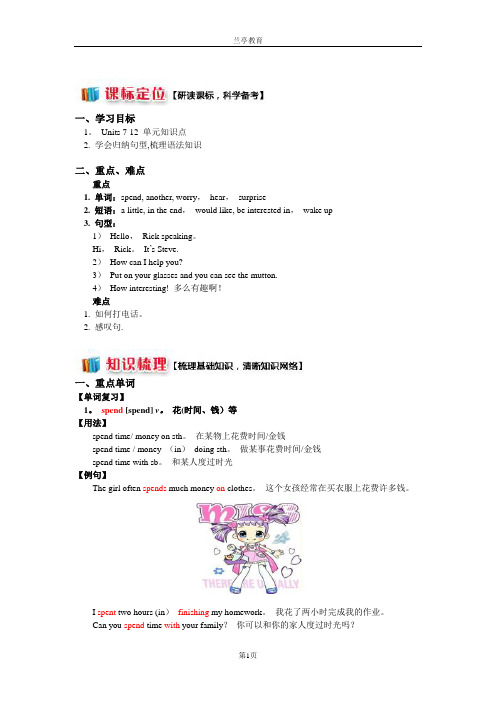
一、学习目标1。
Units 7-12 单元知识点2. 学会归纳句型,梳理语法知识二、重点、难点重点1. 单词:spend, another, worry,hear,surprise2. 短语:a little, in the end,would like, be interested in,wake up3. 句型:1)Hello,Rick speaking。
Hi,Rick。
It’s Steve.2)How can I help you?3)Put on your glasses and you can see the mutton.4)How interesting! 多么有趣啊!难点1. 如何打电话。
2. 感叹句.一、重点单词【单词复习】1。
spend [spend] v。
花(时间、钱)等【用法】spend time/ money on sth。
在某物上花费时间/金钱spend time / money (in)doing sth。
做某事花费时间/金钱spend time with sb。
和某人度过时光【例句】The girl often spends much money on clothes。
这个女孩经常在买衣服上花费许多钱。
I spent two hours (in)finishing my homework。
我花了两小时完成我的作业。
Can you spend time with your family?你可以和你的家人度过时光吗?【拓展】(1) pay常用来表示“付款”,主语是人,其后用介词for。
sb。
pays money for sth. = sb。
spends money on/ doing sth。
(2)cost 表示“花钱”,主语为物。
sth。
costs sb. money. = sb. pays money for sth。
= sb。
spends money on/(in)doing sth。
人教版七年级下册英语期末复习Unit1-Unit12课本语法知识点提纲(全面!)

人教版七年级下册英语期末复习Unit1-Unit12课本语法知识点提纲七年级下册Unit1一、重点词组与句子Section A1.下象棋play chess2.弹吉他Play the guitar3.说英语/汉语/日语speak English/Chinese/Japanese4.参加艺术俱乐部join the art club5.音乐/游泳俱乐部music/swimming club6.学校文艺表演school show7.跟....说talk to/with8.打/表演中国功夫do Chinese kungfu9.想要做want to do sth10.擅长......be good at sth/doing sth1.Can you draw? 你会画画吗?2.I want to join the art club.我想要参加美术社团。
3.You are very good at telling stories 你很擅长讲故事。
4.Then join two clubs,the story telling club and the art club!那就参加两个社团,讲故事社团和美术社团!5.What club do you want to join?你想参加什么社团?6.I want to join the chess club.我想要参加国际象棋社团。
7.Can you and Tom play chess? 你和汤姆会下国际象棋吗?8.Students wanted for school show学校文艺表演招募学生。
9.We want students for the school show. 我们学校表演需要学生。
10.Please talk to Mr Zhang after school. 请放学后跟张老师说。
11.What can you do? 你会做什么?e and show us! 老战士给我们看看吧!Section B1.弹钢琴/拉小提琴play the piano/violin2.打鼓play the drums3.题足球/打篮球play football/basketball4.唱歌跳舞sing and dance5.养老院the old people’s home6.善于和....相处be good with7.交朋友make friends8.打...电话找某人call sb at9.在...方面帮忙help with10.在周末on the weekend/on weekends3.I like to play basketball. 我喜欢打篮球。
七年级英语下册期末总复习知识点

Unit 5 Topic1重点短语1.on foot go …on foot = walk ( to )…2.atthe school gate在学校大门口3. on weekdays 在平日,在工作日4.after school 放学后 after class 下课后5. in one’s free time在某人空闲时间6. have a rest 休息一下7. read books 读书 8. go swimming 去游泳9. listen to music 听音乐10. watch TV 看电视11. do(one’s) homework 做作业 12. have classes 上课13. for a little while 一会儿 14. go to bed 上床睡觉15. come on 快点,加油,来吧 16. get up 起床17. talk with / to sb.与某人谈话 18. at school 在学校、在上课19. and so on ……等等重点句型1.Happy New Year! The same to you.2.Your new bike looks very nice. Thank you.3.How do you usually come to school? —I usually cometo school by subway.4.How often do you go to the library?5.The early bird catches the work. (谚语) 笨鸟先飞6.Work / Study must come first. 工作/ 学习必须放在第一位!7.What time does the class begin? / What time do theclasses begin?8.I have four classes in the morning and two in theafternoon.9.She goes to bed at about a quarter to ten. 她九点四十五分睡觉。
七年级下英语知识点大全

七年级下英语知识点大全七年级下英语是中学英语学习的基础阶段,对学生掌握英语基本语法、词汇、语音、语调等方面起到关键作用。
本文将从以下几个方面为大家梳理七年级下英语的知识点大全。
一、语法1. 一般现在时和一般过去时的构成和用法;2. 肯定形式、否定形式、疑问形式和回答形式的句型构成;3. 简单句和复合句的区别和构成;4. 祈使句、感叹句、陈述句以及疑问句的用法和句型构成;5. 含有情态动词的句子的构成和用法。
二、词汇1. 基本词汇:数字、颜色、天气、家庭、职业、饮食、交通、娱乐、身体各部位、时间等;2. 动词的一般现在时和一般过去时的时态变化和用法;3. 常用介词、副词、形容词、代词、连词等的用法;4. 重点词汇:名词、动词、形容词、副词等的辨析;5. 常用短语和惯用语的用法和意义。
三、语音1. 英语元音、辅音的发音方法及发音区别;2. 重音、轻音的区别及在不同单词中的应用;3. 连读、缩读、语调等基本语音技巧的运用。
四、阅读1. 了解文章结构和主旨;2. 阅读理解的基本方法和技巧;3. 文章中的重点句型和重点词汇;4. 不同类型文章的写作风格和特点。
五、写作1. 熟悉英语的基本句型;2. 如何遣词造句地表达自己的观点;3. 写作技巧和写作准则;4. 书信格式、邮件格式、短文格式等不同类型写作的特点和要求。
六、听说1. 听力技巧和训练方法;2. 默写、听音辨词、听音辨意训练;3. 听力材料的种类和来源;4. 口语练习、语音训练等讲练结合的技巧。
以上就是七年级下英语知识点大全,每个知识点都是相互关联的,只有融会贯通,才能在英语学习中更快地进步。
在学习过程中,一定要注重日积月累,努力掌握基础知识,打牢英语学习的基础。
英语复习资料七下

英语复习资料七下中学阶段是每个人求学路程中非常重要的一个时期,为了取得更好的学业成绩,每个学生都需要充分准备考试,并且掌握良好的学习方法。
而英语作为世界上比较通用的语言,是每个学生必须掌握的技能之一。
如何备考英语呢?本篇文章针对七年级下学期的英语学习内容,整理了一些复习资料,供大家参考。
词汇与语法单词和语法是学习英语最基本的部分。
七年级下学期的重点内容包括动词的时态,一些常用的词汇例如数字,家庭成员,食品等等。
建议同学备考时可以使用红宝书或者蓝宝书进行重点复习。
阅读理解除了要记单词和学习语法外,阅读理解也是英语学习的重中之重。
英语阅读理解需要进行全面和深入的理解,建议同学们多读短文和长篇阅读材料,并在阅读中积累常用的短语和表达。
听力英语口语和听力是英语学习的另两个基本部分。
为了提高自己的听力能力,建议同学们多听一些英语歌曲,广播,电视节目或者相应的录音资料。
听力训练对于掌握英语发音,语速和表达方式都非常有帮助。
其他学习资源英语作为全球通用的语言,对于学生来说相关的学习资源也非常丰富。
学习英语需要使用不同的方法和资源,以便更好更轻松地掌握语法,单词和其他各种技能。
一些有用的学习资源如下:1. Duolingo –免费的在线语言学习工具。
2. 学而思网校–一个提供在线辅导和备考材料的大型教育品牌。
3. Quizlet –一款免费的在线外语学习应用,集合了语法,单词,口语等等学习资源。
4. YouTube –在YouTube上有各种英语学习频道,学生们可以订阅来获得有用的学习技巧,并且通过评论和点赞让其他同学互相交流。
总之,英语学习需要坚持不懈的练习和学习,并且积累巨大的时间和精力。
掌握好基本的语法和单词,经常进行语言的实践和交流,还有选择合适的学习资源,都是取得好成绩的关键。
牛津译林版英语七年级下册units5-8期末复习重点知识点总结和试卷
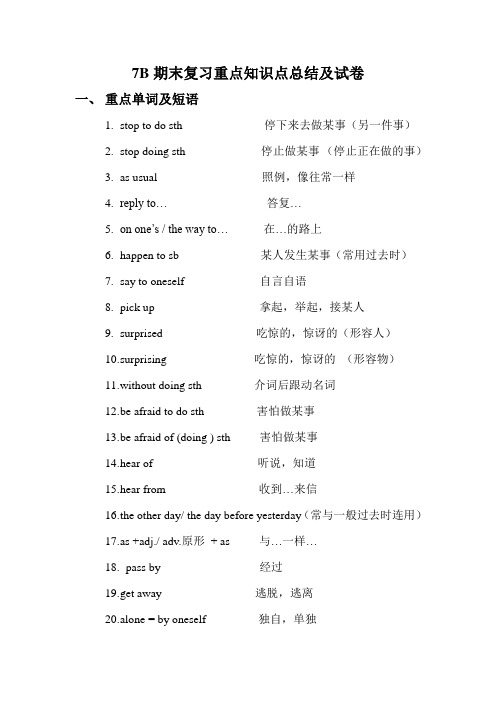
7B期末复习重点知识点总结及试卷一、重点单词及短语1.stop to do sth 停下来去做某事(另一件事)2.stop doing sth 停止做某事(停止正在做的事)3.as usual 照例,像往常一样4.reply to…答复…5.on one’s / the way to…在…的路上6.happen to sb 某人发生某事(常用过去时)7.say to oneself 自言自语8.pick up 拿起,举起,接某人9.surprised 吃惊的,惊讶的(形容人)10.s urprising 吃惊的,惊讶的(形容物)11.w ithout doing sth 介词后跟动名词12.b e afraid to do sth 害怕做某事13.b e afraid of (doing ) sth 害怕做某事14.h ear of 听说,知道15.h ear from 收到…来信16.t he other day/ the day before yesterday(常与一般过去时连用)17.a s +adj./ adv.原形+ as 与…一样…18.pass by 经过19.g et away 逃脱,逃离20.a lone = by oneself 独自,单独21.t hrough 穿过,通过(空间)go through 通过…22.p ut up 搭,竖立23.c entury ----centuries 世纪,百年24.e xcited/exciting 分别形容人和物25.e nough 足够的(放于名词前,形容词后)be enough to do sth26.t oo… to太…而不能…27.d ecide to do sth 决定做某事28.r each sth 伸手(脚)够到29.f ail to do sth 做某事失败30.s end sb sth= send sth to sb 发送…给…31.b e able to do sth= can/could 能/会做某事32.p ay for…为…付款33.r aise sth for sb 为…筹集/募集…34.r aise sth to do sth 募集…做某事35.s ave…from…从…救出…36.b e badly hurt 伤的很重37.p rotect…from doing sth保护…免于….38.p ut it out 把它扑灭(代词放中间)39.i n hospital 住院40.i n the hospital 在医院41.n od—nodded (过去式)点头42.n ews (不可数) 新闻,消息43.b y the way 顺便说说44.n o problem 没问题45.d o/try one’s best to do sth尽某人最大努力做某事46.c areful---careless(反义词)47.d o well in doing=be good at doing sth 擅长做某事48.a t the age of…在…岁的时候49.r ecommend sb for…推荐某人获得…50.t ake part in 参加(节目,游戏,活动)51.l ose one’s way = get lost迷路52.t each sb (代词用宾格)sth 教…(代词用宾格)53.t each sb to do sth 教某人做某事54.b ark at sb 对某人叫/吠55.l ook after…well=take good care of…照顾好…56.h ave trouble doing sth 做某事很困那/麻烦57.a ll the time 一直,总是58.a gree with sb 同意某人的观点agree to do sth 同意做某事59.w eigh up to…重达…60.g row up 成长,长大61.t alk= speech 演讲(可数)62.n oisy---noisily adv. 嘈杂的/地(变y为i加ly)期末复习试卷一、单项选择1. She is 11-year-old girl and enjoys playing chess.A. an; anB. a; theC. an; /D. the; /2. Everybody is too tired. Let's a rest.A. stop havingB. to stop havingC. stop to haveD. stop to have3. He was to hear of the news this morning.A. surprising; surprisedB. surprised; surprisingC. surprised; surprisedD. surprising; surprising4.She met her old friend the other day.A. on her way to homeB. on her way homeC. in my way homeD. in my way to home5.The big fire in Australia was at last.A. put inB. put outC. put upD. put down6.Lots of students couldn’t hear the teacher on Ding ding(钉钉)A. enough clearlyB. clearly enoughC. enough clearD. clear enough7.The sunshine went the window, so the whole room was bright.A. acrossB. overC. throughD. past8.--- I can’t reach the book on the shelf, can you help me?--- .A. Never mindB. No problemC. That's all rightD. That's OK9.He did n’t ___________ his pen-friend and he missed her very much.A. heard fromB. hear ofC. heard ofD. hear from10.Many people have _ to do because of the disease Corona vi(新型冠状病毒).A. everythingB. somethingC. anythingD. nothing11.Doctor Zhong nanshan says it still _______ long time to cure(治愈) the diseaseA. spendB. costC. payD. take12.The Eiffel Tower, a ____________ tower, is 130 years old this year.A. 324 metres tallB. 324-metres-tallC. 324-metre-tallD. 324-metre tall13.She felt very sad because she ___________ in the middle-term exam.A. reachedB. failedC. hitD. entered14.The small giraffe is too short the leaves on the tree.A. to reachingB. to reachC. reachingD. not to reach15. good news! The doctors found the medicine to cure the disease!A. HowB. What aC. WhatD. How a二、完形填空阅读下面短文,掌握其大意,从每题所给的A. B. C. D四个选项中,选出最佳选项。
七年级下英语期末复习知识点

七年级下英语期末复习(一)Unit 1 Can you play the guitar?1,情态动词+V原 can do= be able to do2, Play+ the+ 乐器+球类,棋类3, join 参加社团、组织、团体4, 4个说的区别:say+内容Speak+语言Talk 谈论 talk about sth talk with sb talk to sb Tell 告诉,讲述tell sb (not)to do sthTell stories/ jokes5, want= would like +(sb)to do sth6, 4个也的区别:too 肯定句末 (前面加逗号)Either否定句末(前面加逗号)Also 行前be 后As well 口语中(前面不加逗号)7, be good at+ V-ing=do well in 擅长于be good for 对…有益 (be bad for对…有害)be good to 对…友好 (good 可用friendly,nice,kind替换) be good with和…相处好=get on/ along well with8,特殊疑问句的构成:疑问词+一般疑问句9, How/ what about+V-ing …怎么样?(表建议)10,感官动词(look, sound, taste, smell, feel)+adj/ like11,选择疑问句:回答不能直接用Yes或者No,要从中选择一个回答12,students wanted for school show(wanted表示招募,含有被动意义) 13,show sth to sb=show sb sth give sth to sb=give sb sth14,help sb (to)do sthHelp sb with sthWith sb’s help= with the help of sbHelp oneself to 随便享用15,be busy doing sth/ be busy with sth16,need to do sth17,be free= have time18,have friends= make friends19,call sb at +电话号码20,on the weekend= on weekends21,English-speaking students 说英语的学生(带有连词符,有形容词性质) 22,do kung fu表演功夫七年级下英语期末复习(二)Unit 2 What time do you go to school?1,问时间用what time或者whenAt+钟点at 7 o’clock at noon/ at nig ht(during/ in the day)On+ 具体某天、星期、特指的一天 on April 1st on Sunday on a cold winter morning In +年、月、上午、下午、晚上2,时间读法:顺读法逆读法:分钟≤30用past five past eight(8:05) half pasteight(8:30) 分钟>30用to a quarter to ten(9:45)整点用…o’clock 7 o’clock(7:00)3,3个穿的区别:wear 表状态,接服装、手套、眼镜、香水等Put on 表动作,接服装Dress 表动作,接sb/ oneself get dressed穿衣3,感叹句:How+adj+主谓!How+adj+a/an +n单+主谓!What+ a/an +adj+ n单+主谓!What+ adj+ n复/ 不可数+主谓!4,from…to…5, be/ arrive late for6,频度副词(行前be 后)Always usually often sometimes seldom hardly never7,一段时间前面要用介词for for half an hour for five minutes8,eat/ have… for breakfast/ lunch/ dinner/ supper9,either…or10,a lot of=lots of11,it is +adj+for sb +to do sth (adj修饰to do sth)It is important for me to learn English.it is +adj+of sb +to do sth (adj修饰sb) It is kind/ friendly/ nice of you to help me.七年级下英语期末复习(三)Unit 3 How do you get to school?1,疑问词How 如何(方式)how long 多长(时间)答语常用“(For/ about +)时间段”how far多远(距离)答语常用“(It’s +)数词 +miles/ meters/kil ometers” how often多久一次(频率)答语常用“Always/ often/ everyday/…”或“次数+时间”等表频率的状语How soon多快,多久以后,常用在将来时中。
人教版七年级英语下册总复习知识点考点总结归纳
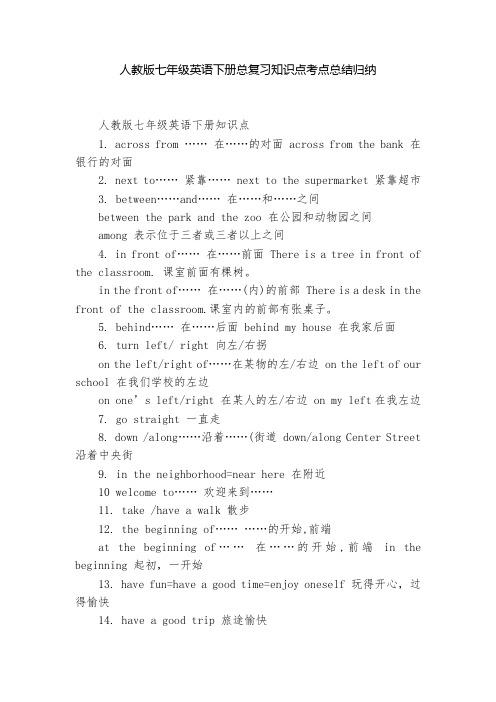
人教版七年级英语下册总复习知识点考点总结归纳人教版七年级英语下册知识点1. across from ……在……的对面 across from the bank 在银行的对面2. next to……紧靠…… next to the supermarket 紧靠超市3. between……and……在……和……之间between the park and the zoo 在公园和动物园之间among 表示位于三者或三者以上之间4. in front of……在……前面 There is a tree in front of the classroom. 课室前面有棵树。
in the front of……在……(内)的前部 There is a desk in the front of the classroom.课室内的前部有张桌子。
5. behind……在……后面 behind my house 在我家后面6. turn left/ right 向左/右拐on the left/right of……在某物的左/右边 on the left of our school 在我们学校的左边on one’s left/right 在某人的左/右边 on my left在我左边7. go straight 一直走8. down /along……沿着……(街道 down/along Center Street 沿着中央街9. in the neighborhood=near here 在附近10 welcome to……欢迎来到……11. take /have a walk 散步12. the beginning of…………的开始,前端at the beginning of……在……的开始,前端in the beginning 起初,一开始13. have fun=have a good time=enjoy oneself 玩得开心,过得愉快14. have a good trip 旅途愉快15. take a taxi 坐出租车16. 到达:get to +地方get here/ there/ home 到这/那/家 arrive in +大地方 I arrive in Beijing. arrive at +小地方I arrive at the bank. reach +地方17.go across 从物体表面横过 go across the street横过马路go through 从空间穿过 go through the forest穿过树林18.on + 街道的名称。
期末复习人教版英语七年级下册单元重点知识点语法汇总

人教版七年级下册-单元重点语法汇总U1情态动词can的用法can是情态动词,意为“能,会”,表示某人或某物具备的能力,还可用来提出请求,没有人称和数的变化,后面直接接动词原形。
下面学习情态动词can的常见用法。
1.表示“能力”,意为“能,会”。
例句:I can speak English.我会讲英语。
2.表示“请求”或“许可”。
例句:Can you help me with my Chinese?你能帮我学汉语吗?You can go to the park after you finish your homework.你做完作业后可以去公园。
3.含有情态动词can的肯定句变否定句时,需在can后加not,其缩写形式为can’t;变疑问句时,情态动词can直接放在句首,构成一般疑问句。
例句:I can sing English songs.我会唱英文歌。
(肯定句)→I can’t sing English songs.我不会唱英文歌。
(否定句)Yao Ming can play basketball.姚明会打篮球。
→Can Yao Ming play basketball?姚明会打篮球吗?(一般疑问句)4.对Can…问句的回答可以用下面几种形式:对询问能力的问句的回答可以说“Yes,…can.”或“No,…can’t.”,表示对能力的肯定或否定;对表示请求的问句的回答可以说“OK./All right.”,表示同意对方的请求。
也可用certainly或sorry来回答。
用certainly作肯定回答,语气更肯定;用sorry作否定回答,语气则更委婉、客气。
例句:—Can you speak English?你会说英语吗?—Yes,I can.是的,我会。
—Can I see your pencil-box,please?请问,我可以看一下你的铅笔盒吗?—All right./Certainly.Here you are.可以。
外研版七年级英语下册期末复习资料(全)

外研版七年级英语下册期末复习资料(全)本篇文章没有明显的格式错误,但是可以进行小幅度的改写,使其更加流畅和易读。
第一模块:短语归纳:1.失物招领箱2.小心…3.从现在开始4.匆忙5.成百上千6.寻找(过程)7.首先8.找到(结果)9.努力做某事(会成功)10.从…中挑选11.试图做某事(成功与否未知)12.此时此刻13.例如(用于列举)14.例如重点句型结构:1.这是谁的…?2.帮助某人做某事3.请小心保管…4.欢迎来到…5.拨…给某人打电话语法专项:物主代词:表示所属关系的代词(…属于谁的)单数人称第一人称第二人称第三人称复数名词性物主代词oursyoursTheirs形容词性物主代词myyourhisheritsmineyourshishersitsouryourtheir形容词性物主代词和名词性物主代词的关系:形容词性物主代词:必须和名词在一起。
例如:My father。
your teacher。
名词性物主代词:相当于与之相对应的形容词性物主代词+名词。
例如:This shirt is mine。
= This is my shirt.第二模块:短语归纳:1.与某人相处融洽2.弹钢琴3.打乒乓球4.怎么样?5.担心…6.擅长做某事7.放风筝8.仅此而已9.乐于做某事重点句型结构:无本篇文章没有明显的格式错误,但是可以进行小幅度的改写,使其更加流畅和易读。
例如,在第一模块中,可以将短语归纳和重点句型结构分开,以便更好地区分它们。
同时,可以将语法专项部分的表格改为更易读的列表形式。
在第二模块中,可以简化短语归纳部分的表述,使其更加简洁明了。
一.短语归纳。
1.take a taxi乘出租车2.go shopping去购物3.have a party举办聚会4.visit a museum参观博物馆5.go to the cinema去电影院6.have a barbecue烧烤7.go to the beach去海滩8.go for a swim去游泳9.go hiking去徒步旅行10.go fishing去钓鱼11.go camping去露营12.have a ic去野餐二.重点句型结构。
人教版七年级下册英语期末复习知识点总结汇编
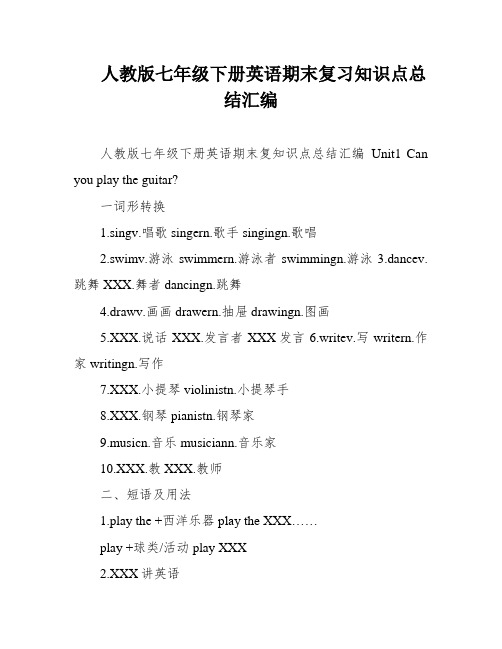
人教版七年级下册英语期末复习知识点总结汇编人教版七年级下册英语期末复知识点总结汇编Unit1 Can you play the guitar?一词形转换1.singv.唱歌singern.歌手singingn.歌唱2.swimv.游泳swimmern.游泳者swimmingn.游泳3.dancev.跳舞XXX.舞者dancingn.跳舞4.drawv.画画drawern.抽屉drawingn.图画5.XXX.说话XXX.发言者XXX发言6.writev.写writern.作家writingn.写作7.XXX.小提琴violinistn.小提琴手8.XXX.钢琴pianistn.钢琴家9.musicn.音乐musiciann.音乐家10.XXX.教XXX.教师二、短语及用法1.play the +西洋乐器play the XXX……play +球类/活动play XXX2.XXX讲英语XXX讲故事talk to/ with sb.和某人交谈 3.be good at + doing XXX擅长做某事=do well in (doing )sthbe good for对……有好处反义:be bad for对……有坏处be good to sb.对……友好= be friendly tobe good with善于应付……的4.make XXX和某人交朋友5.stay at home待在家6.help sb。
with sth/ help sb。
(to )do XXX帮助某人做某事7.on the weekend = on weekends在周末XXX教某人做某事XXX什么俱乐部music XXX XXX10.want to do XXX想要做某事want sb。
to do XXX想要或人做某事11.like to do sth/ doing XXX喜爱做某事12.be free/busy有空/忙碌的13.call sb。
七年级下册英语知识点总结归纳人教版
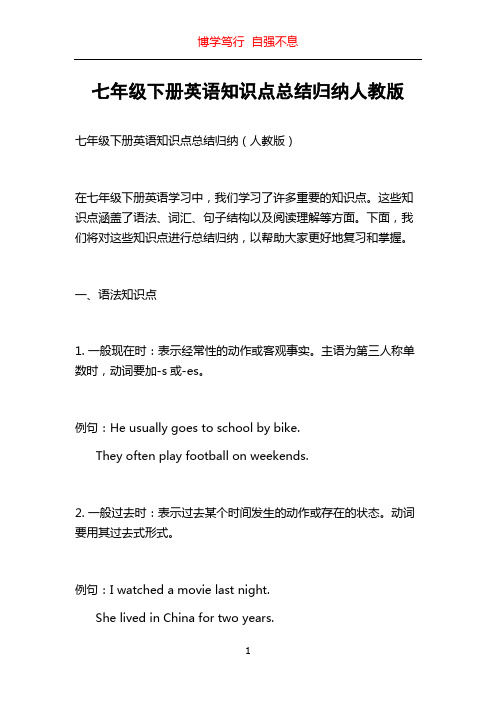
七年级下册英语知识点总结归纳人教版七年级下册英语知识点总结归纳(人教版)在七年级下册英语学习中,我们学习了许多重要的知识点。
这些知识点涵盖了语法、词汇、句子结构以及阅读理解等方面。
下面,我们将对这些知识点进行总结归纳,以帮助大家更好地复习和掌握。
一、语法知识点1. 一般现在时:表示经常性的动作或客观事实。
主语为第三人称单数时,动词要加-s或-es。
例句:He usually goes to school by bike.They often play football on weekends.2. 一般过去时:表示过去某个时间发生的动作或存在的状态。
动词要用其过去式形式。
例句:I watched a movie last night.She lived in China for two years.3. 现在进行时:表示说话时正在进行的动作。
构成:主语+be动词(am, is, are)+动词-ing。
例句:They are playing basketball in the park.We are learning English now.4. 一般将来时:表示将来要发生的动作或存在的状态。
构成:主语+will+动词原形。
例句:I will visit my grandparents next weekend.She will be a doctor in the future.5. 情态动词:can, may, must等,表示能力、许可、必须等。
例句:You can go to the park with us.Students must wear school uniforms.6. 宾语从句:用来充当主句中动词的宾语的从句。
例句:I think that he is a good student.She knows where the nearest supermarket is.二、词汇知识点1. 动词短语:由动词与副词/介词组成的短语。
初一下知识点总结归纳英语
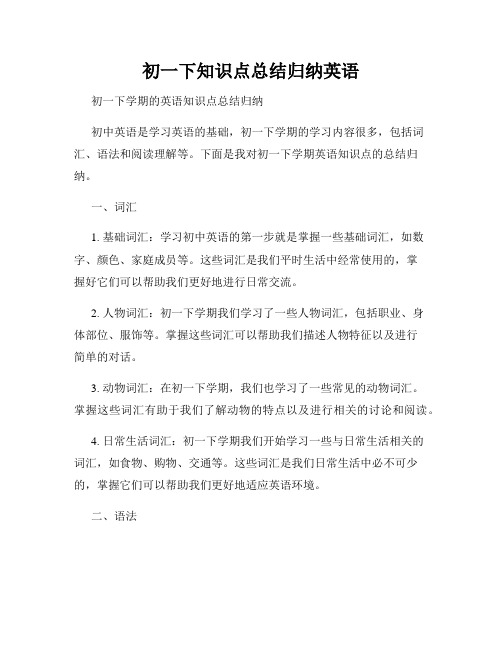
初一下知识点总结归纳英语初一下学期的英语知识点总结归纳初中英语是学习英语的基础,初一下学期的学习内容很多,包括词汇、语法和阅读理解等。
下面是我对初一下学期英语知识点的总结归纳。
一、词汇1. 基础词汇:学习初中英语的第一步就是掌握一些基础词汇,如数字、颜色、家庭成员等。
这些词汇是我们平时生活中经常使用的,掌握好它们可以帮助我们更好地进行日常交流。
2. 人物词汇:初一下学期我们学习了一些人物词汇,包括职业、身体部位、服饰等。
掌握这些词汇可以帮助我们描述人物特征以及进行简单的对话。
3. 动物词汇:在初一下学期,我们也学习了一些常见的动物词汇。
掌握这些词汇有助于我们了解动物的特点以及进行相关的讨论和阅读。
4. 日常生活词汇:初一下学期我们开始学习一些与日常生活相关的词汇,如食物、购物、交通等。
这些词汇是我们日常生活中必不可少的,掌握它们可以帮助我们更好地适应英语环境。
二、语法1. 一般现在时:在初一下学期,我们学习了一般现在时的构成和用法。
通过学习一般现在时,我们可以表达我们的习惯、爱好以及现阶段的情况。
2. 定冠词和不定冠词:初一下学期,我们学习了冠词的用法。
掌握冠词的用法可以帮助我们正确地使用名词,并且可以提高我们的阅读理解能力。
3. 情态动词:在初一下学期,我们学习了情态动词的用法,如can, could等。
情态动词可以表示能力、允许、建议等,掌握它们的用法有助于我们更好地表达自己的意见和请求。
4. 直接引语和间接引语:初一下学期,我们开始学习引语的用法。
了解直接引语和间接引语的转换规则有助于我们更好地理解和运用对话和文章中的引语部分。
三、阅读理解在初一下学期的英语课程中,阅读理解是一个重要的组成部分。
阅读理解的内容涉及各种主题,包括人物介绍、旅行经历、传统节日等。
通过阅读理解的训练,我们可以提高我们的阅读速度和理解能力,从而更好地理解和运用英语。
总结起来,初一下学期的英语知识点主要包括词汇、语法和阅读理解。
外研版七年级英语下册期末复习资料(全)

外研版七年级英语下册期末复习资料(全) Module 1Phrases:1.Lost and found box - a box for lost and found items2.Be careful with… - be us with…3.From now on - starting now4.(Be) in a hurry - in a rush5.Hundreds of - many。
numerous6.Look for - search for7.First of all - firstly8.Find - discover。
locate9.Try to do sth - attempt to do something10.Choose from - select from11.Try doing sth - attempt to do something12.At the moment - currently13.Such as - for example14.For example - as an nKey XXX structures:1.Whose + noun + is this。
- Whose… is this?2.Help sb do sth - assist XXX3.Please be careful with… - please handle with care…4.e to + n - e to…5.Call sb at + phone number - dial… to call someone Grammar focus:Possessive pronouns: XXXSingular:PersonAdjective possessive pronoun1st personmy2nd personyour3rd personhis/her/itsNoun possessive pronounXXXyourshis/hers/itsPlural:Noun possessive pronounoursyoursXXXAdjective and noun possessive pronouns:Adjective possessive pronoun: must be used with a noun。
七年级下册英语知识点归纳总结

七年级下册英语知识点归纳总结七年级下册英语知识归纳1【重点短语】1. lost and found box 失物招领箱2. wele back 欢迎回来3. first of all 首先4. here is/are... 这有...5. from now on 从现在开始6. be careful with 小心保管7. whose bag 谁的包8. talk to sb. 与某人交谈9. mobile phone 移动电话,手机10. get on 上车 ( get off 下车)11. two thousand 两千 (thousands of 数以千计的...)12. look for 寻找13. at the moment 现在14. in a hurry 匆忙地15. alot of 许多,大量16. hundreds of 数以百计的17. on the train 在火车上18. every day 每天19. such as 例如20. make a list of 列一张...的清单21. ask/answer questions 问/回答问题【重点句型】1. Wele back to school! 欢迎回到学校!2. Whose bag is this? 这是谁的书包?3. It’s mine. 它是我的。
4. Are these crayons yours? 这些是你的蜡笔吗?5. Whose tapes are these? 这些是谁的磁带?6. Here’s a purple wallet! 这儿有个紫色钱包。
7. I think it’s Betty’s. 我认为它是贝蒂的。
8. Everyone, please be careful with your things from now on. 请大家从今以后仔细对待你们的东西。
9. People often lose things when they’re travelling or when they’re in a hurry. 当人们旅行或在匆忙中时,他们经常丢东西。
初一期末英语重难点总结

初一期末英语重难点总结一、重点词汇1. 名词:名词是指人、物、地点或想法的名称。
初中英语中的名词包括单数名词、复数名词、可数名词和不可数名词等。
2. 动词:动词是指表示行为、状态或存在的词。
在初一英语中,动词分为及物动词和不及物动词。
及物动词需要带宾语,而不及物动词则不需要。
3. 形容词和副词:形容词用于描述名词,而副词则用于描述动词。
初一英语中的形容词和副词变化较少,但需要注意其用法。
4. 介词:介词是用来连接名词或代词与其他句子成分的词。
初一英语中的常用介词有in、on、under、behind等。
5. 冠词:冠词用于限定名词的用法。
初一英语中的冠词分为定冠词和不定冠词。
定冠词有the,不定冠词有a和an。
注意不同情况下冠词的用法。
6. 代词:代词是用来代替名词的词语。
初一英语中的常用代词有I、you、he、she、it、we、they等。
还有人称代词、物主代词、反身代词、疑问代词、不定代词等。
7. 数词:数词是表示数目的词语。
初一英语中的数词有基数词和序数词,比如one,two,three等。
8. 情态动词:情态动词是用来表示说话人的情绪态度、推测、命令、允许、可能性等的动词。
初一英语中的情态动词有can、could、may、might、must、shall、should、will、would等。
9. 短语动词:短语动词是指由一个动词和一个或多个副词或介词组成的动词。
初一英语中的短语动词有break up、give up、pick up、look for等。
10. 时态:时态用于表示动作发生的时间。
初一英语中的时态包括一般现在时、一般过去时、一般将来时等。
二、难点句型1. There be句型:There be句型用于表示某个地方存在某个人或物。
初一英语中需要注意句子结构和形式的变化。
2. 祈使句:祈使句用来表示请求、命令、建议或警告等。
初一英语中的祈使句常用动词原形作为谓语。
3. 条件句:条件句表示前后两个事件之间的因果关系。
初一下册英语知识点总结归纳

初一下册英语知识点总结归纳一、词汇1. 常用单词:如人称代词、颜色、数字、时间、家庭成员等。
2. 动词:如be动词、情态动词、实义动词等。
3. 形容词和副词:如描述人物特征、事物性质等的形容词,以及表示程度、方式等的副词。
4. 介词和连词:如表示位置、时间、原因等的介词,以及连接句子、词语等的连词。
5. 短语和固定搭配:如常用的动词短语、形容词短语、副词短语等。
二、语法1. 时态:如一般现在时、一般过去时、一般将来时等。
2. 语态:如主动语态和被动语态。
3. 句型:如陈述句、疑问句、祈使句、感叹句等。
4. 从句:如宾语从句、定语从句、状语从句等。
5. 主谓一致:如主语和谓语在人称和数上要保持一致。
6. 直接引语和间接引语:如将直接引语转化为间接引语的规则。
7. 比较级和最高级:如形容词和副词的比较级和最高级的构成和用法。
8. 不定代词:如some, any, no, every等不定代词的用法。
9. 冠词:如a, an, the的用法。
10. 名词性从句:如主语从句、宾语从句、表语从句等的用法。
三、阅读理解1. 阅读技巧:如快速浏览文章,找出关键词,理解文章大意等。
2. 阅读题型:如选择题、填空题、判断题等。
3. 阅读材料:如故事、新闻报道、广告等不同类型的阅读材料。
四、写作1. 书写规范:如字母大小写、标点符号的使用等。
2. 句子结构:如简单句、并列句、复合句等的构成和用法。
3. 段落结构:如开头段、主体段、结尾段的写作方法。
4. 作文类型:如记叙文、说明文、议论文等不同类型的作文写作。
五、听力和口语1. 听力技巧:如预测答案、注意关键词等。
2. 听力题型:如听对话选择正确答案、听短文回答问题等。
3. 口语表达:如问候、介绍自己、询问信息等常用口语表达。
4. 口语练习:如角色扮演、对话练习等口语训练方法。
六、文化知识1. 英语国家的文化习俗:如节日庆祝活动、饮食习惯等。
2. 英语国家的地理知识:如国家名称、地理位置等。
最新外研版七年级初一英语下册期末复习资料全套

欢迎共阅MODULE1一.短语归纳。
1.lostandfoundbox 失物招领箱2.becarefulwith …小心…3.fromnowon 从现在开始4.(be)inahurry 匆忙5.hundredsof 成百上千6.lookfor 寻找(过程)7.firstofall 首先8.find 找到(结果)9.trytodosth 努力做某事(会成功)10.choosefrom 从…中挑选 11.trydoingsth 试图做某事(成功与否未知)12.atthemoment 此时此刻 13.suchas 例如(用于列举)14.forexample 例如 二.重点句型结构1. Whose+名词+isthis?这是谁的…?2. helpsbdosth.帮助某人做某事3. Pleasebecarefulwith …请小心保管…4. Welcometo+地点欢迎来到…5. callsbat+电话号码拨…给某人打电话 三.语法专项。
物主代词:表示所属关系的代词(…属于谁的)形容词性物主代词和名词性物主代词的关系: 形容词性物主代词:必须和名词在一起。
Myfather,yourteacher...物主代词名词性物主代词:相当于与之相对应的形容词性物主代词+名词。
人称单数复数形容词性物主代词 名词性物主代词 形容性物主代词 名词性物主代词 第一人称 my mineourours第二人称your yours your yours 第三人称his his theirTheirsher hers itsitsThisshirtismine.=Thisismyshirt.MODULE2一.短语归纳。
1.getonwellwithsb.与某人相处融洽2.playthepiano弹钢琴3.playtabletennis打乒乓球4.whatabout…?=howabout…?...怎么样?5.worryabout…担心…6.begoodatdoingsth.擅长做某事7.flyakite放风筝8.that’sall仅此而已9.bereadytodosth.乐于做某事二.重点句型结构。
七年级英语下册期末考试重要知识点复习

七年级英语下册期末考试重要知识点复习Seventh Grade English Exam ReviewUnit 1: Can you play the guitar?1.Can you play the guitar。
"Can" + verb infinitive does not change with subject or number.Example: Can he play the guitar。
Yes。
he can。
/ No。
he can't play the guitar。
She can speak English very well.2.Play + sports or musical instruments。
Use "play" + "the" for instruments.Examples: Play basketball / play the guitar / play chess.e of "want": "want to do something"Example: I want to join the music club.4.Phrases with "good": "be good with someone" means good at dealing with them or getting along with them.Example: She is good with the elderly.Be good at" means to be skilled at something.Examples: I am good at English。
/ He is good at swimming.Be good for" means to be beneficial for something.Example: It is good for your health.e of "tell": "tell someone something" or "tell someone to do something"Example: Tell stories / story-telling club.e of "talk": "talk to someone" or "talk with someone (about something)"Examples: Talk to your parents。
- 1、下载文档前请自行甄别文档内容的完整性,平台不提供额外的编辑、内容补充、找答案等附加服务。
- 2、"仅部分预览"的文档,不可在线预览部分如存在完整性等问题,可反馈申请退款(可完整预览的文档不适用该条件!)。
- 3、如文档侵犯您的权益,请联系客服反馈,我们会尽快为您处理(人工客服工作时间:9:00-18:30)。
Unit 1-12 1-6单元知识积累
7-12单元为主
非谓语动词
• • • • want to do sth. →想做某事 want sb. to do sth. →想让某人做某事 have to do sth. →不得不做某事 like to do sth. →喜爱做某事 like doing sth. →喜欢做某事 • would like sth. →想要某物 would like to do sth. →愿意做某事 would like sb. to do sth. →愿意某人做某事
近义词辨析: 花费
• It takes sb. some time to do sth. →某人花多少时间做某事 • sb. spends some time/money (in )doing sth. →某人 花多少时间做某事 sb. spends some time/money on sth. →某事花了某人多少时间/钱 • sth. costs sb. some money. → 某物花了某人多少钱 • sb. pays some money for sth. →某人为某物付了多少钱
Sb pay money for sth
物 cost sb time/ money.
2.重点难点辨析:be far from, away from, from ..to .
•
far from, 离…远
• • • My school is far from my home. 具体路程+away from, My school is 10 kilometers away from my home. From…to, 从。。到。。 It’s 10 kilometers (away) from my school to my home. A +be +路程距离+B,
可跟双宾语的动词
• show sb. Sth→给某人看某物 Please show me the map. show sth. to sb. →把某物给某人看 Please show the map to me. • buy sb. sth. →为某人买某物 Mother bought me a bike. • buy sth. for sb. →为某人买某物 Mother bought a bike for me. • give sb. sth →把某物给某人 Jim gave me an English dictionary. • give sth. to sb. →把某物给某人 Jim gave an English dictionary to me.
Yes, you can. / No, you can’t.
• 8. He maybe 25 years old.
He may be 25 years old. Maybe he is 25 years old.
1.重点知识归纳:
1.重/难点辨析:花费 take , spend, pay ,cost It takes sb time/ money to do sth. (有时态 变化,过去式took,) Sb spend time/ money on sth/ in doing sth.
纠错
• • • • • • • • 1. play the chess play chess 2. play guitar play the guitar 3. join in the English Club join the English Club 4. She is good with singing. is good at 5. He is good at the students. is good with 6. Is she at home or at school? Yes,she is 7. May I watch TV after supper? She is at home Yes, you may. / No, you may not
非谓语动词
• tell sb. to do sth. →告诉某人做某事 Mother told me to go shopping with her. • ask sb. to do sth. →请某人做某事 Jim ask me to go rowing with him.
非谓语动词
• let sb. do sth. →让某人做某事 Let me sing a song for you. • let sb. not do sth. →让某人不做某人 • make sb. sth. →为某人制造某物 My father made me a kite. • make sth for sb. →为某人制造某物 My father made a kite for me. • make sb. do sth. →逼迫某人做某事 His brother often makes him stay in the sun.
动名词
• be interested in sth. →对某事感兴趣 English is very interesting. We are all intereste d in it. • enjoy doing sth. →喜欢做某事 They all enjoy living and working in China. • be good at sth./doing sth. →擅长某事/做某 事 They are good at swimming.
…To do/doing 两种用法
• find/see/ sb. do sth. → 观看/看见某人做某事 I saw you pick an apple just now. • find/see/sb. doing sth. → 观看/看见某人正在做某事 I saw you playing basketball with your clas smates on the playground last Sunday.
其他 动词词组
• hope to do sth. →希望某人做某事 I hope to see you soon. • welcome to sp →欢迎到某地 Welcome to China. • be friendly to sb. →对某人友好 Mr. Wang is very friendly to us. • take sb. to sp→带某人到某地 Mr. Wang took us to the Summer Palace last Su nday.
…to do/doing 两种用法
• forget doing sth. →忘记做过某事了 forget to do sth. →忘了做某事了 • remember doing sth. →记得做过某事了 remember to do sth. →记住做某事 • stop to do sth. →停下来去做某事 stop doing sth. →停止做某事
期末考查要点
语法复习内容: 一般现在时(注意第三人称单数动词的使用,打好基础) 现在进行时(现在分词前的be动词的使用) 一般过去时(不规则动词变化,不忘规则变化的特点) 情态动词(情态动词后接动词原形) 祈使句 (动词原形开头,省略主语you, 否定用 Don’t ) 动词不定式:want to do , decide to do , help (to) do , like to do,would like to do , It’s time to do.. . make sb. do , let sb. do, watch sb. do, help sb.(to) do , 动词ing 形式 enjoy doing , stop doing, like doing ,thanks for doing, how (what )about doing , have fun(n.) doing , find sb. doing ,
非谓语动词
• help sb. to do sth. →帮助某人做某事 Lucy often helps Lily to wash her clothes. • help sb. do sth. →帮助某人做某事 He usually helps me learn English. • help sb. with sth. →帮助某人做某事 I sometimes help my mother with the housework.
近义词辨析: 到达
• get to sp→达到某地 I got to Beijing on the morning of May 1st. • arrive at /in sp →达到某地 I arrived in Beijing on the morning of May 1st. • reach sp→达到某地 I reached Beijing on the morning of May 1st.
speak, say, tell, talk
• speak意为“说话”,其后跟某种语 • •
Do you speak Chinese? 你会说汉语吗?
talk意为“谈话,交谈”,后面接介词about或to/with。例如: Don’t talk to me! Let’s talk about our vacation say强调说话的内容。例如: Can you say it in English? 你能用英语说话吗? They say China is great.(说的内容是中国是伟大的。) tell意为“告诉”、“讲述”, Can you tell me about China? you tell me not to eat Zongzi tell stories/lies
动名词
• thank sb. for sth./doing sth. →感谢某人做某事 Thank you for your help. Thank you for helping me. • How/ what about doing sth?→做某事怎么样? How about going fishing?
